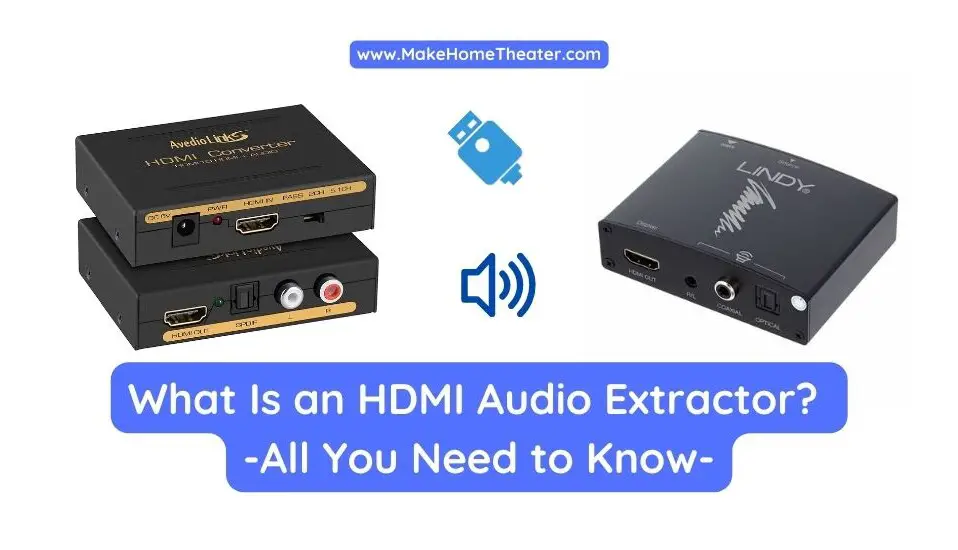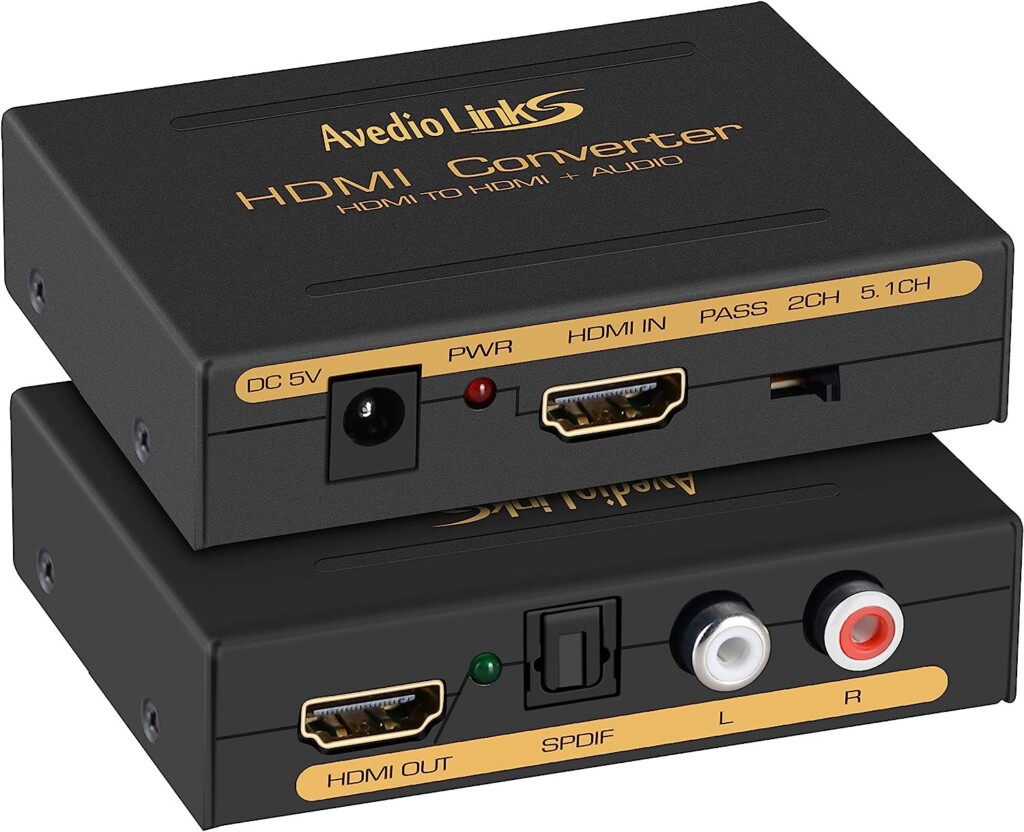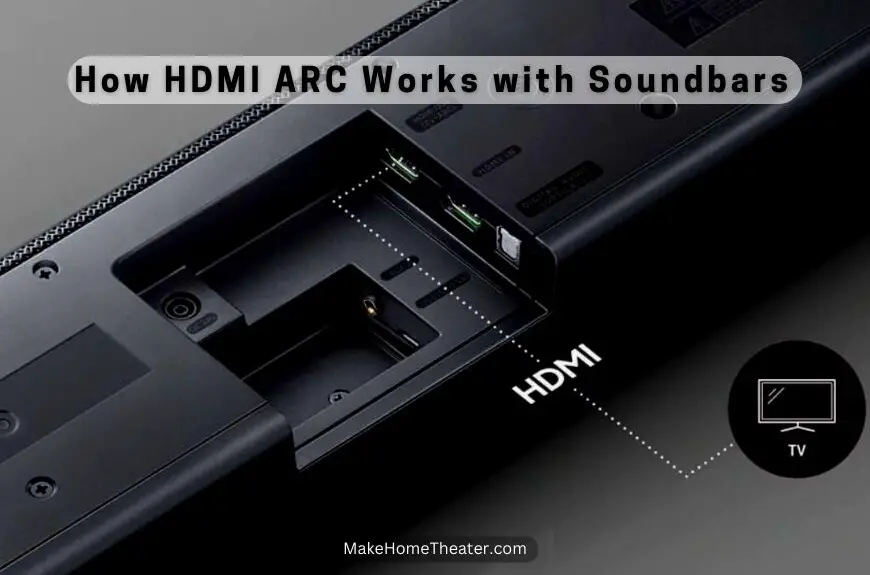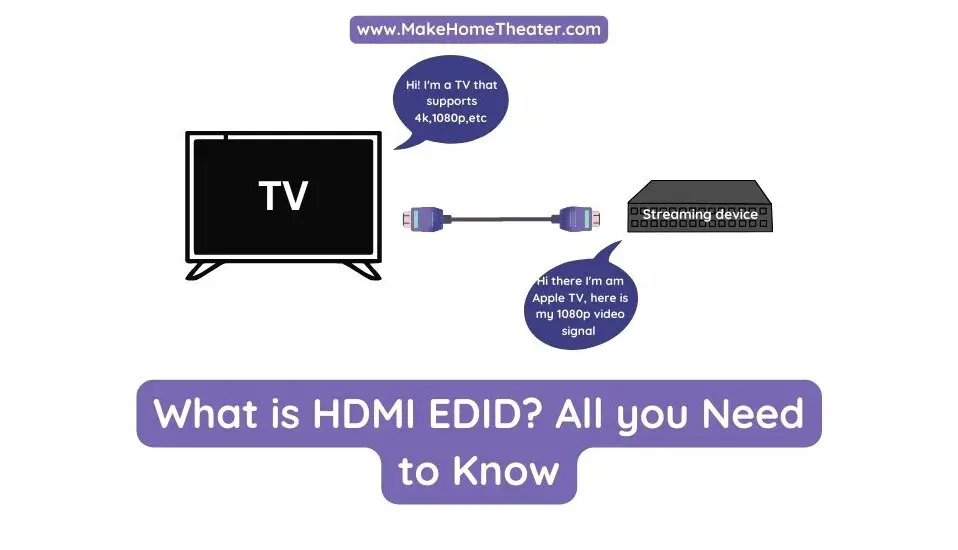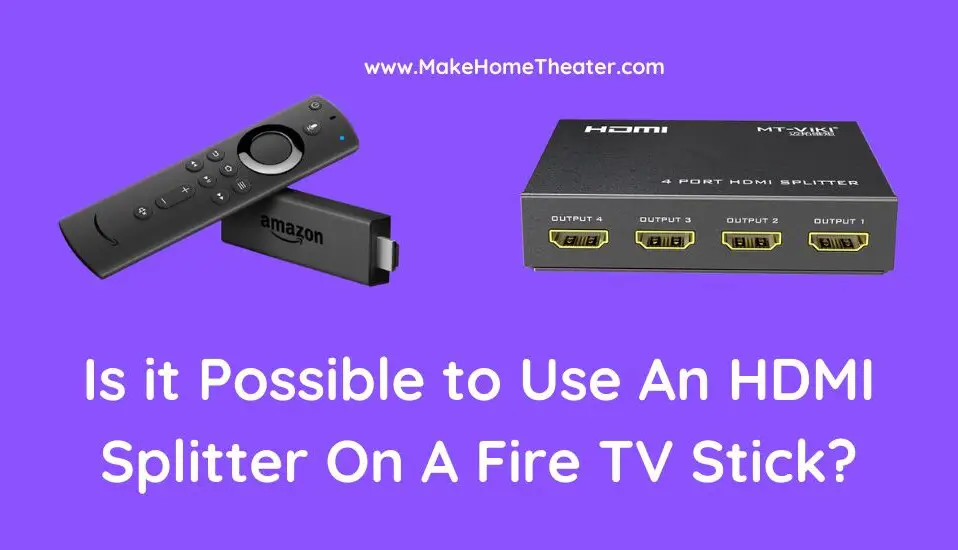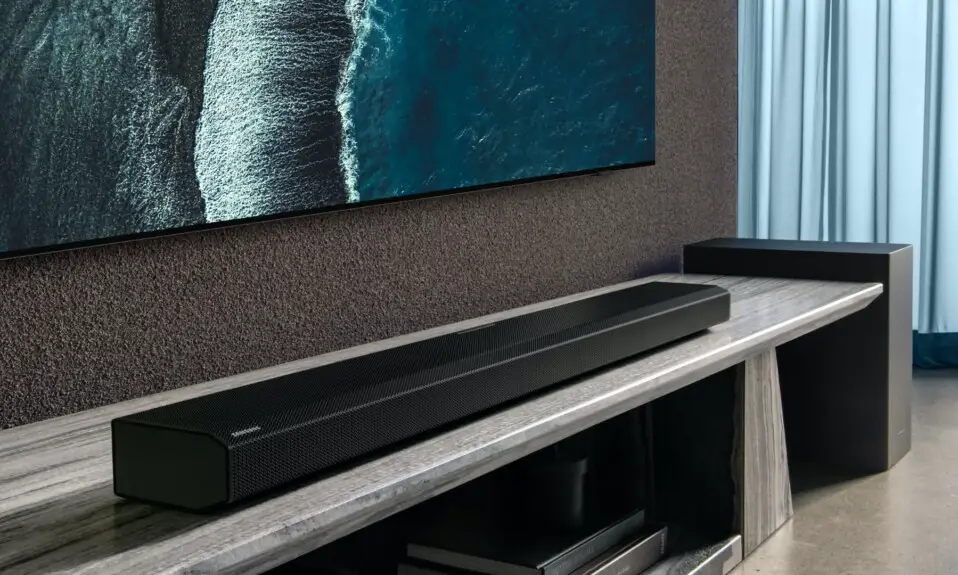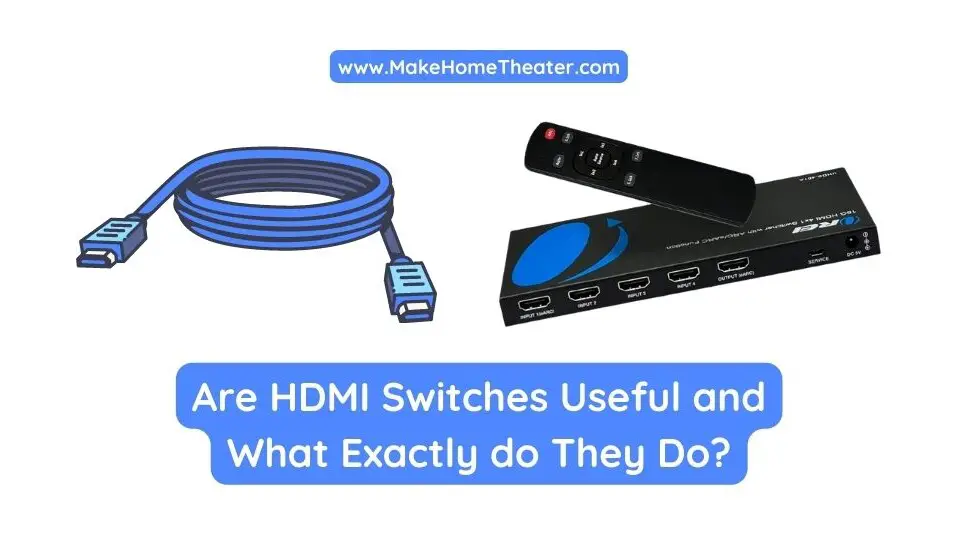If you’re looking to upgrade your home theater room to also function as a listening room, an HDMI audio extractor may be just what you need. This piece of equipment is particularly useful when it comes to transmitting audio from HDMI-only sources to analog-only audio receivers. By splitting an HDMI input signal into an audio output and a normal HDMI output, an HDMI audio extractor can seamlessly integrate your home theater into your home audio system.
While most HDMI audio extractors output only an analog line-level stereo signal with RCA or 3.5 mm connections, some models are capable of outputting analog 7.1 sound and more. The device is small, easy to use, and perfect for bridging the divide between digital and analog components.
Installing an HDMI audio extractor is a fairly straightforward process, and for the intermediate home audio or home theater user, it’s pretty intuitive. Depending on the capabilities of the HDMI audio extractor, you can expect to spend around $20-150 plus cables. With the right equipment, you can enjoy the full benefits of both your home theater and home audio system.
Table of Contents
How Does an HDMI Audio Extractor Work?
To convert HDMI to analog audio or any other format, an HDMI audio extractor must first isolate the audio signal from the HDMI signal and then decrypt and recode it into another type of audio signal, usually analog. In most cases, an HDMI audio extractor is necessary to achieve this conversion.
Since HDMI is a digital signal, it cannot be sent directly to an analog system, resulting in an ineffective audio (or video) signal. Therefore, using a cable that seems to convert HDMI to RCA is not a viable option in most cases. These cables are designed to work with devices that already decrypt the HDMI signal before outputting it.
An HDMI cable is built with 19 pins that transmit a variety of digital signals, including audio, video, remote control commands, and device information. However, these signals are specific to HDMI and require digital conversion for use with other formats.
When it comes to transmitting information over long distances, directional HDMI cables are more effective than traditional HDMI cables. However, even with directional HDMI cables, an HDMI audio extractor would still be necessary for converting the digital audio signal to other formats.
Reasons to Use an HDMI Audio Extractor
If you need to convert HDMI to an audio-only source, an HDMI audio extractor is a practical solution. While it may be the only solution in certain scenarios, such as when using an analog sound system, there are times when alternative solutions may be available that do not require an HDMI audio extractor.
Some Examples of Using an HDMI Audio Extractor
The most straightforward scenario that requires an HDMI audio extractor is when you need to transmit audio from an HDMI-only source to an audio-only receiver. This is particularly relevant to audiophiles who also enjoy watching movies.
If your home theater doubles as a listening room, you may want to invest in a secondary stereo system for higher-quality music playback. If you listen to music from HDMI-only sources like Roku, AppleTV, or other media streamers, you can easily route it to your stereo through an HDMI audio extractor.
A more complex setup that requires an HDMI audio extractor is when you need to connect HDMI-only components to an older analog receiver. In such a scenario, you can use an HDMI splitter to direct one HDMI signal to your display device and the other through your HDMI audio extractor to your receiver.
Alternatively, you can simplify this setup by incorporating both HDMI audio extraction and a wireless HDMI transmitter(our guide). However, for the purposes of this discussion, we will focus on a wired setup in a single room.
Can the Sound Quality be Affected by an HDMI Audio Extractor?
Rest assured, an HDMI audio extractor should not degrade your audio quality. Since HDMI is a digital signal, it should remain relatively consistent in quality unless you impair it through the use of HDMI couplers or other similar devices.
However, several factors can affect the audio quality, including the sample rate capabilities of the HDMI audio extractor, the HDMI version that your devices support, and the length of the cable used to connect them.
The sample rate is particularly critical since it determines how often a device’s signal is received. The higher the sample rate, the more accurately the intermittent digital signal can imitate a smooth analog signal.
A lower sample rate can negatively impact your sound quality in two ways. First, it may prevent you from reproducing higher frequencies, even if your speaker system can broadcast them or your ears can hear them. Second, it may dull the minor timbres in the sound. However, if these concepts are unfamiliar to you, then you need not worry about them.
Maximum Sample Rate
It’s worth noting that not all HDMI audio extractors are created equal. Some models may only output a line-level stereo signal with RCA or 3.5mm connections, while others may output analog 7.1 sound or more. When considering an HDMI audio extractor, it’s important to evaluate the sample rate capabilities of the device and ensure that it meets your needs.
Another factor to consider is the length of the cable used to connect your devices. Longer cables can lead to signal degradation, which may impact the quality of your audio output. It’s generally recommended to use high-quality HDMI cables that are no longer than necessary to reduce the risk of signal loss.
Overall, an HDMI audio extractor is a useful tool for integrating your home theater into your home audio system or bridging the gap between digital and analog components. With careful consideration of the factors outlined above, you can ensure that your audio quality remains high and your viewing experience is seamless.
Signal Path Length
If the cable length is too long, it can cause signal degradation, resulting in errors in the signal transmission and ultimately a lower sample rate. This can cause issues like audio dropouts or even a complete loss of audio.
To combat this, manufacturers of HDMI cables and devices have taken steps to ensure that longer cables can maintain the same quality signal as shorter cables. These include using thicker cables or active components like amplifiers or equalizers to boost the signal and correct any errors.
In general, for HDMI cables up to 15 meters in length, there should not be any noticeable degradation in signal quality, but longer cables may require additional signal boosters or repeaters.
How to Choose Your HDMI Audio Extractor?
Using an HDMI audio extractor doesn’t have to diminish your sound quality. By paying attention to the specifications and avoiding unnecessary use of long cables, you can enjoy high definition sound without sacrificing audio fidelity.
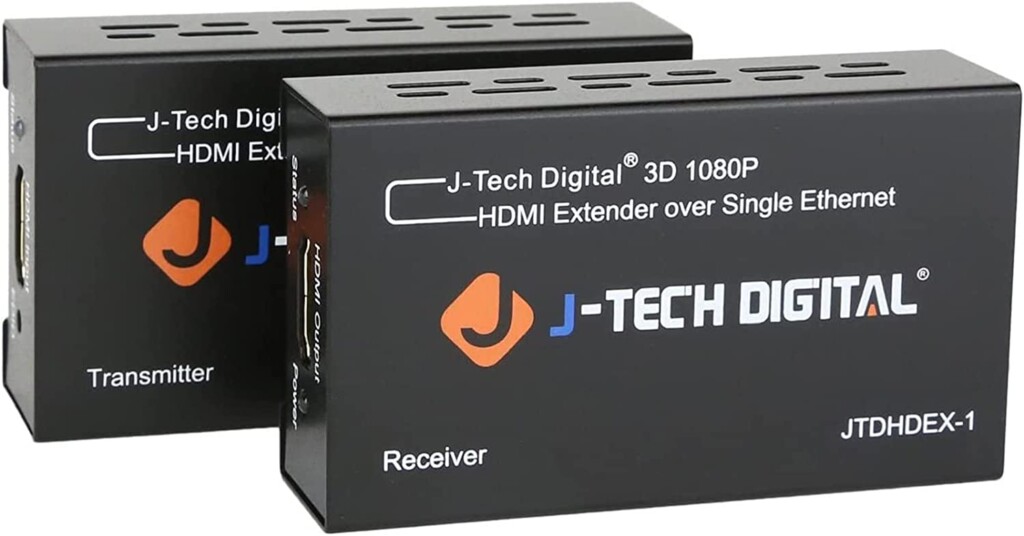
Newer HDMI audio extractors are typically equipped with HDMI 2.0 or later, which ensures that sample rates for 7.1 sound or less shouldn’t be a concern. Even budget models, like the J-Tech Digital Premium (on Amazon), can extract 5.1 channels.
Basic models usually only output stereo sound, meaning you may have to invest in a decent 5.1 or 7.1 system and obtain specific cables to connect all of your components. However, good 7.1 channel extractors like the Monoprice Blackbird on Amazon are still priced in the double digits and not triple.
Various models of HDMI audio extractors support different output formats such as RCA, 3.5 mm, digital optical, and HDMI. Moreover, some equipment provides HDMI audio extraction functions in addition to other features like source and output switching.
To ensure compatibility with your chosen HDMI audio extraction solution, it’s important to select an output format that matches it. Analog audio signals like RCA and 3.5mm can be converted, whereas digital signals like digital optical and HDMI require hardware to decrypt them.
There are numerous reasons why you might consider using an HDMI audio extractor, and now you should be better equipped to determine if it is the appropriate solution for your needs. By following these guidelines, you can choose the HDMI audio extractor that suits your requirements.
Related Q&A

Q1. What is an HDMI audio extractor?
A: An HDMI audio extractor is a device that extracts audio signals from an HDMI source and outputs them as a separate audio signal.
Q2. How does an HDMI audio extractor work?
A: An HDMI audio extractor works by intercepting the audio signal from an HDMI source and separating it from the video signal. The audio signal is then outputted in a different format.
Q3. What are the benefits of using an HDMI audio extractor?
A: Using an HDMI audio extractor allows you to extract audio signals from an HDMI source and output them as a separate audio signal, which can be useful in a variety of scenarios.
Q4. Can an HDMI audio extractor be used to extract audio from a Blu-ray player?
A: Yes, an HDMI audio extractor can be used to extract audio from a Blu-ray player and output it in a different format.
Q5. What are some common audio output formats for HDMI audio extractors?
A: Common audio output formats for HDMI audio extractors include RCA, 3.5mm, and optical.
Q6. Is an HDMI audio extractor compatible with all HDMI devices?
A: Most HDMI audio extractors are compatible with a wide range of HDMI devices, but it’s always best to check the device specifications before making a purchase.
Q7. Can an HDMI audio extractor be used to extract audio from a streaming device?
A: Yes, an HDMI audio extractor can be used to extract audio from a streaming device and output it in a different format.
Q8. What is the maximum audio quality that can be extracted using an HDMI audio extractor?
A: The maximum audio quality that can be extracted using an HDMI audio extractor depends on the device’s specifications and the source device’s audio quality.
Q9. How can an HDMI audio extractor improve audio quality?
A: An HDMI audio extractor can improve audio quality by separating the audio signal from the video signal and outputting it in a format that is better suited for your audio system.
Q10. Are HDMI audio extractors easy to install and use?
A: Yes, most HDMI audio extractors are easy to install and use, with simple plug-and-play functionality. However, it’s always best to consult the user manual for specific instructions.


